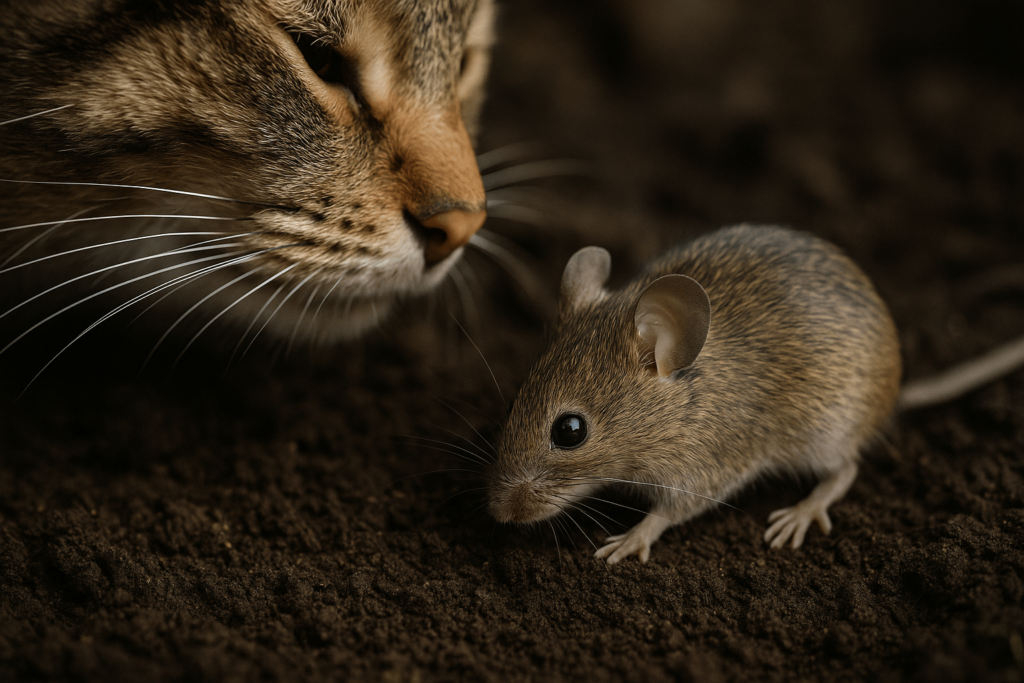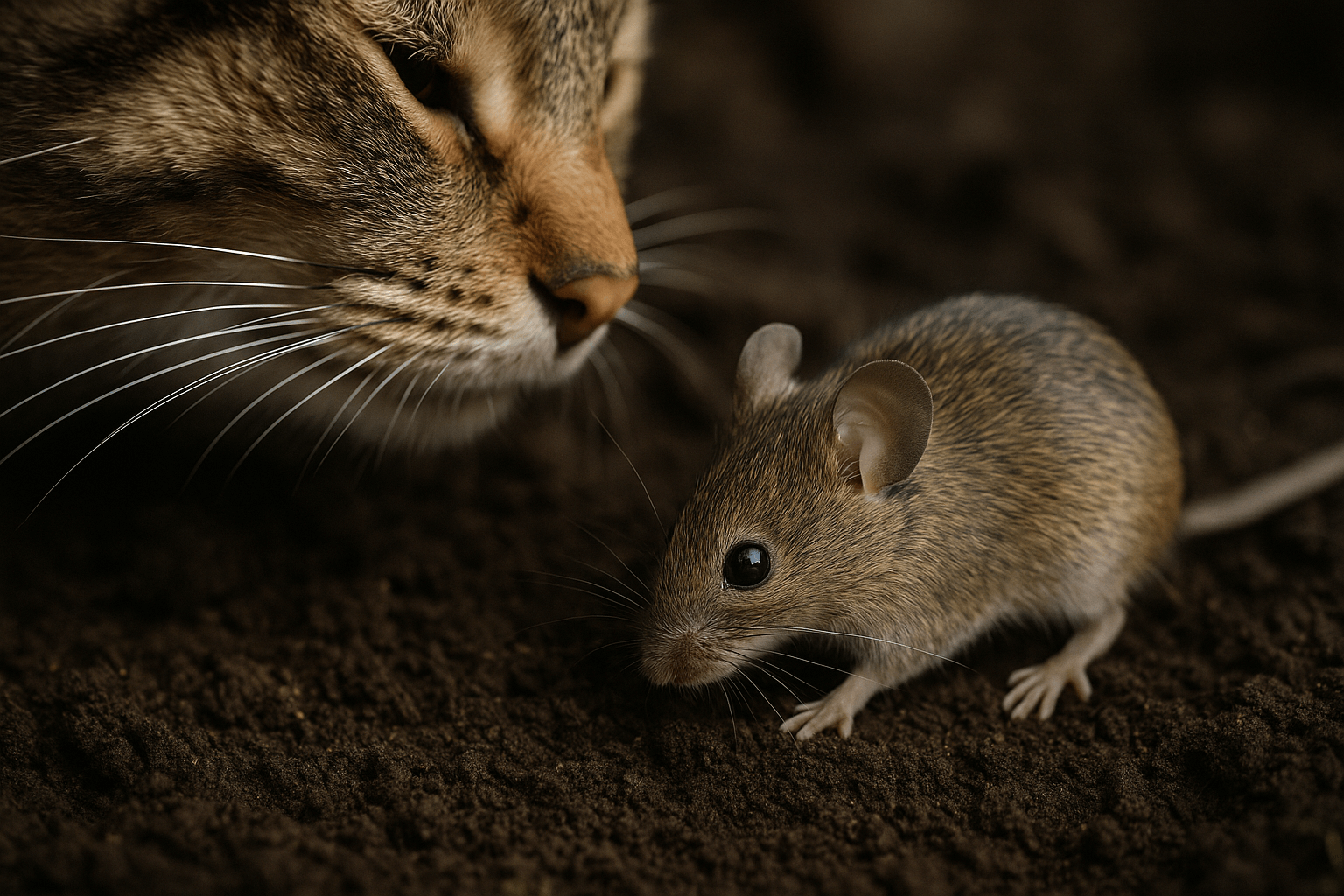Cat Scent for Mice: A Natural Deterrent?
When it comes to keeping mice out of your home, many homeowners turn to traditional traps or chemical repellents. However, there’s a growing interest in natural solutions, such as using cat scent for mice. Cats are natural predators of rodents, and their scent alone can evoke fear in mice, deterring them from entering your space. But how effective is this method, and what are the best ways to use cat scent as a deterrent? In this blog post, we’ll explore the science behind this phenomenon, practical tips for implementation, and whether cat scent truly lives up to its reputation as a pest-control solution.
How Cat Scent Works as a Mouse Deterrent
The effectiveness of cat scent lies in the instinctive fear mice have of their predators. Understanding the mechanisms behind this natural deterrent can help you use it more effectively.
Mice Are Hardwired to Fear Predators:
Mice have an innate ability to detect predator scents, which triggers their fight-or-flight response and encourages them to flee the area.Chemical Signals in Cat Scent:
Cat fur, urine, and pheromones contain specific chemical compounds that signal danger to mice, even if no cat is physically present.Territorial Marking Mimics a Cat’s Presence:
By strategically placing cat scent around your home, you can create the illusion of a cat’s territory, discouraging mice from settling in.Non-Lethal and Eco-Friendly:
Unlike poisons or traps, using cat scent poses no harm to mice or the environment, making it an appealing option for humane pest control.Works Best in Combination with Other Methods:
While cat scent can deter mice, combining it with other preventive measures ensures comprehensive protection against infestations.
By leveraging these principles, cat scent becomes a powerful tool in your pest-control arsenal, harnessing nature’s instincts to keep your home mouse-free.

Practical Ways to Use Cat Scent for Mice
Implementing cat scent as a deterrent doesn’t require owning a cat—there are several creative ways to replicate the effect. Here’s how you can incorporate this method into your pest-control strategy.
Collect Fur from a Cat:
If you know someone with a cat, ask for some shed fur. Place small amounts near entry points like doors, windows, or cracks where mice might enter.Use Cat Litter Strategically:
Spread used (but clean) cat litter in areas prone to mouse activity. The scent will linger and discourage mice from approaching.Invest in Synthetic Cat Pheromones:
Commercial products mimic the chemical signals found in cat scent, offering a convenient and consistent way to deter mice without needing a real cat.Place Items with Cat Odor Around Your Home:
Old blankets, toys, or bedding belonging to cats can emit lingering scents that repel mice when positioned in key locations.Combine with Essential Oils:
Pair cat scent with essential oils like peppermint or eucalyptus, which also act as natural rodent repellents, for enhanced effectiveness.
With these practical techniques, you can make your home less inviting to mice while maintaining a safe and humane approach.
Check this guide 👉Understanding Cat Nose Cancer: Best 7 Expert Tips!
Check this guide 👉Understanding Cat Nose Fungus: Best 7 Health Tips!
Check this guide 👉Cat Runny Nose Treatment: Best 7 Expert Tips!
Benefits of Using Cat Scent | Limitations to Consider |
|---|---|
Eco-friendly and non-toxic | Requires regular reapplication |
Humane alternative to traps or poisons | May not work on large infestations |
Creates a long-lasting deterrent | Effectiveness depends on scent strength |
Easy to implement at home | Not a standalone solution |
Leverages natural instincts of mice | Synthetic options may be costly |
Signs That Cat Scent Is Working
To determine whether cat scent is effectively deterring mice, look for these indicators that suggest your efforts are paying off.
Reduced Droppings:
Fewer mouse droppings around your home indicate that mice are avoiding the area due to the presence of cat scent.No New Chew Marks:
If you notice fewer signs of gnawing on furniture, wires, or food packaging, it’s likely the scent is keeping mice at bay.Quieter Nights:
Mice are nocturnal creatures. If your nights become quieter, it could mean they’re steering clear of your property.Decreased Activity Near Entry Points:
Check common entryways for reduced scratching sounds or movement, signaling that mice are staying away.Unchanged Placement of Repellents:
If the items emitting cat scent remain undisturbed, it suggests mice are avoiding those areas entirely.
These signs confirm that cat scent is working as intended, helping you maintain a pest-free environment.
Tips for Maximizing the Effectiveness of Cat Scent
To get the most out of using cat scent as a deterrent, follow these expert tips for optimal results.
Focus on High-Traffic Areas:
Identify spots where mice are most active, such as kitchens, basements, or attics, and concentrate your efforts there.Refresh Scents Regularly:
Over time, scents fade. Reapply cat fur, litter, or synthetic pheromones every few days to maintain their potency.Seal Entry Points:
Combine scent-based deterrence with sealing cracks and gaps to prevent mice from finding alternative routes into your home.Clean Without Removing Scent:
Avoid over-cleaning areas where you’ve applied cat scent, as excessive scrubbing can eliminate the deterrent effect.Monitor Results Consistently:
Keep track of changes in mouse activity to assess whether the scent is working and adjust your strategy as needed.
By following these tips, you can enhance the impact of cat scent and protect your home from unwanted visitors.
Common Misconceptions About Cat Scent
Despite its growing popularity, there are several misconceptions about using cat scent for mice. Clarifying these myths helps set realistic expectations for its use.
Myth: Cat Scent Alone Eliminates Infestations:
While effective, cat scent works best alongside other pest-control methods rather than as a standalone solution.Myth: Only Real Cats Produce Effective Scents:
Synthetic pheromones and collected fur can replicate the same deterrent effects without requiring a live cat.Myth: Cat Scent Lasts Indefinitely:
Like any scent, it fades over time and needs regular refreshing to remain potent.Myth: All Mice React the Same Way:
Individual mice may vary in sensitivity to predator scents, though most exhibit avoidance behaviors.Myth: Cat Scent Attracts Cats:
Using cat scent won’t lure stray cats into your home—it only targets mice.
Understanding these facts ensures you use cat scent wisely and avoid unrealistic assumptions.
Alternatives to Cat Scent for Deterring Mice
If cat scent isn’t feasible or sufficient, consider these alternative methods to complement your pest-control efforts.
Ultrasonic Repellents:
Devices emitting high-frequency sounds can drive mice away without harming them.Peppermint Oil Spray:
Soak cotton balls in peppermint oil and place them in problem areas to repel mice naturally.Steel Wool Barriers:
Stuff steel wool into cracks and crevices to block entry points while deterring chewing attempts.Motion-Activated Lights:
Install lights that activate when motion is detected to scare mice away from dark hiding spots.Natural Predators:
Encourage owls or other natural predators to inhabit your yard for long-term rodent control.
These alternatives provide additional layers of defense against mice infestations.
How to Prevent Future Mouse Problems
Preventing future issues goes beyond immediate deterrents. Adopting proactive habits minimizes the risk of mice returning to your home.
Declutter Regularly:
Remove piles of clutter where mice might hide or nest, reducing their incentive to stay.Store Food Properly:
Keep pantry items in sealed containers and clean up crumbs promptly to eliminate food sources.Inspect Your Home Annually:
Conduct routine checks for cracks, holes, or gaps that could serve as entry points for mice.Maintain Outdoor Spaces:
Trim vegetation and remove debris from your yard to reduce hiding spots for rodents.Educate Yourself on Early Warning Signs:
Learn to recognize subtle signs of mice, such as faint scratching noises or tiny droppings, to address problems early.
Taking these preventive steps ensures your home remains a mouse-free zone year-round.
Frequently Asked Questions About Cat Scent for Mice
Does cat scent actually work to repel mice?
Yes, studies show that mice are naturally repelled by cat scent due to their instinctive fear of predators.
Can I use cat scent if I don’t own a cat?
Absolutely! You can use synthetic pheromones, borrowed fur, or other cat-related items to achieve the same effect.
How long does cat scent last as a deterrent?
The scent typically lasts a few days before fading, so regular reapplication is necessary for continued effectiveness.
Will cat scent harm my pets or family?
No, cat scent is completely safe for humans and other animals, making it a humane pest-control option.
What should I do if cat scent doesn’t work?
Combine it with other methods, such as traps or professional pest control, to address persistent infestations.
Harnessing Nature’s Power Against Mice
Using cat scent as a deterrent offers a simple, eco-friendly, and humane way to keep mice out of your home. By understanding how mice react to predator scents and implementing practical strategies, you can create an unwelcoming environment for these pesky intruders. While cat scent may not solve every infestation on its own, it serves as a valuable component of a broader pest-control plan. With patience and persistence, you can leverage the power of nature to protect your home and enjoy peace of mind—all while respecting the balance of the ecosystem.
Canned Pumpkin for Cat Diarrhea: Best 7 Expert Tips! Natural remedy to firm stools, soothe upset bellies, and support gut health safely.
Can a Cat Give You Scabies? Best 7 Expert Tips! Discover the truth about feline mites, human skin risks, and how to protect yourself—without panic.
Cat Flea vs Human Flea: Best 7 Expert Tips! Discover the truth about bites, species, and how to eliminate infestations for good.
Weird Cat Behaviors: Best 7 Expert Tips! Discover why cats do strange things—and how to understand, not punish, their instincts for a happier home.





